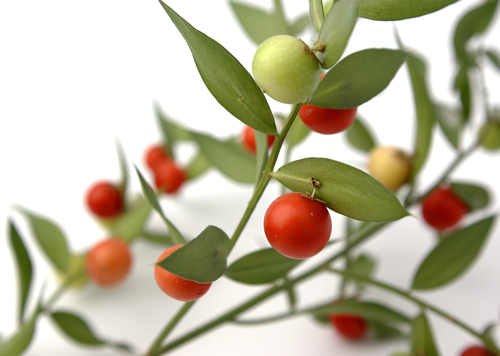Description
Botanical: Ruscus aculeatus
Family: Liliaceae (lily) Other common names: Kneeholy, Knee Holly, Kneeholm, Jew's Myrtle, Sweet Broom, Pettigree, Box Holly
Country of Origin: Europe
Butcher's Broom is a wonderful way to relieve excess fluid in the system and a bloated feeling. If you are troubled with varicose veins or swelling brought on by excess water or poor circulation, Butcher's Broom may just provide the relief you seek.
Beneficial Uses:
Butcher's Broom is thought to be a mild, but extremely effective, herbal diuretic that promotes the flow of urine and helps to reduce excess fluids and water from the body. This is especially beneficial for relieving bloated feelings and may help to lose excess water weight. Because it encourages the flow of urine, it is useful for combating bladder and urinary tract infections and is also thought to enhance the health of the kidneys and bladder.
Butcher's Broom is said to be particularly helpful in relieving edema, the accumulation of fluid in tissues (swelling). In clinical trials, Butcher's Broom was shown to reduce swelling after radiation treatment in the upper arm. It is also thought to ease swollen lymph glands caused by syphilis and may alleviate the pain and swelling in the carpal tunnel of the wrist, caused by repetitive motion. It is said to be especially good for swollen ankles, a common problem with many people, including older adults and people with chronic fatigue syndrome, diabetes, scrofulous growths or Parkinson's disease.
Butcher's Broom is believed to support good circulation throughout the body and help relieve circulatory disorders, especially to the legs. The herb is said to have cleansing properties, particularly within the blood vessels, and maintain healthy blood viscosity and cholesterol levels. It is thought to reduce venous capacity and the pooling of blood in the legs. Butcher's Broom increases the tone in the veins and has protective effects on the lining and smooth muscle of the capillaries. Butcher's Broom's flavonoid content strengthens blood vessels, reduces capillary fragility and helps to maintain healthy circulation.
Further venal health is demonstrated in the chemical constituents of Butcher's Broom. The saponin glycoside, ruscogenin, helps to tighten and strengthen the veins and make them less porous. This encourages blood to move up and out of the legs, and these qualities make Butcher's Broom excellent in cases of varicose veins, thrombo-phlebitis and chilblains.
Butcher's Broom is said to be good for hemorrhoids by tightening the dilated blood vessels that form hemorrhoids, and is believed to be particularly effective for easing the burning and itching sensations accompanying inflamed hemorrhoids.
Butcher's Broom is thought to help orthostatic hypotension (a drop-in blood pressure upon rising from a sitting position that causes dizziness and fainting) and is also believed to be useful for alleviating vertigo.
Contraindications:
Butcher's Broom is most effective when taken with vitamin C. Large amounts of Butcher's Broom (many times the recommended dosage) should not be taken, as it may cause vomiting, purging, low blood pressure and toxicity. Butcher's Broom should not be taken with high blood pressure medications nor with medications for benign prostatic hypertrophy (BPH) or MAO inhibitors. It is recommended that this herb be used under the supervision of a health care provider.


